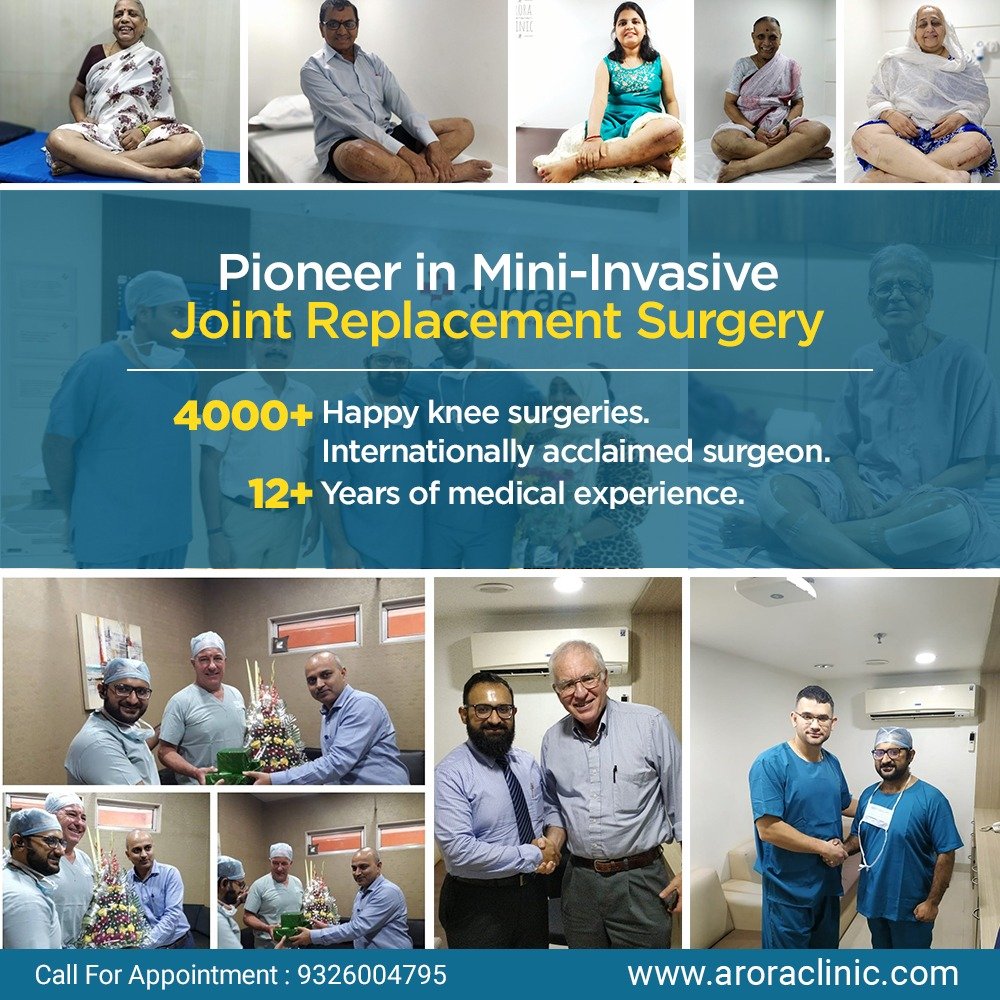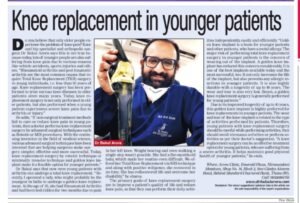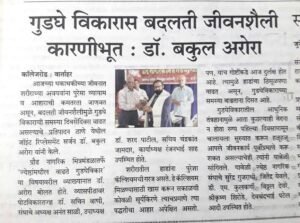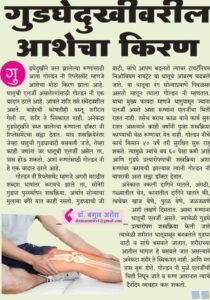
Painless Hip Replacement Surgery!
Painless Hip Replacement Surgery also known as Minimally Invasive Surgery technique where the muscles around the hip joints are NOT CUT. This approach doesn’t incite the inflammation as much as the conventional technique. Hence the surgery is painless, recovery is quick and most patients begin walking within 3 to 6 hours after surgery, moreover, they can also start climbing stairs on the next day of the operation itself.
Minimally Invasive technique of Hip Replacement Surgery in Thane has plenty advantages to patients , lets see its comparison with Traditional Technique.
Traditional Hip Replacement involves making an incision on the side of the hip (lateral approach) or the back of the hip (posterior approach). Both techniques involve detachment of muscles and tendons from the hip in order to replace the joint. Detachment of these muscles may result in increased pain after surgery and often prolongs the time to fully recover by months or even years. As per Dr. Bakul Arora , Hip Replacement Surgeon in Thane “Failure of these muscles to heal after surgery may increase the risk of hip dislocation (the ball and socket separating), which is the leading cause of hip replacement failure”. Hip precautions after surgery (no bending greater than 90 degrees, no crossing legs, no excessive rotation) are generally required for this reason.

Direct anterior hip replacement is a minimally invasive surgical technique. This approach involves a 3 to 4 inch incision on the front of the hip that allows the joint to be replaced by moving muscles aside along their natural tissue planes, without detaching any tendons. This approach often results in quicker recovery, less pain, and more normal function after hip replacement. Because the tendons aren’t detached from the hip during direct anterior hip replacement, hip precautions are typically not necessary. This allows patients to return to normal daily activities shortly after surgery with a reduced risk of dislocation.
ADVANTAGE OF DIRECT ANTERIOR APPROACH FOR HIP REPLACEMENT


Hip replacement surgery is typically recommended for patients who are experiencing chronic pain and mobility issues in their hips. This can be due to a variety of conditions, including osteoarthritis, rheumatoid arthritis, and hip fractures. Some of the common symptoms that may indicate a need for hip replacement surgery include:
If you are experiencing any of these symptoms, it is important to talk to your Hip Replacement doctor in thane about whether hip replacement surgery may be right for you.
Types of Hip Replacement Surgery
There are two main types of hip replacement surgery: total hip replacement and partial hip replacement. The type of surgery that is best for you will depend on the severity of your condition and other factors, such as your age and overall health.
Total hip replacement surgery involves removing the damaged or diseased hip joint and replacing it with an artificial joint. This procedure is typically recommended for patients with severe osteoarthritis or rheumatoid arthritis. During the procedure, a hip replacement surgeon in Thane will make an incision in the hip area and remove the damaged joint. The artificial joint is then placed in the socket and secured with screws or cement.
Partial hip replacement surgery also known as hip resurfacing, is a less invasive procedure that is typically recommended for patients with less severe hip conditions. During this procedure, only the damaged or diseased part of the hip joint is replaced with an artificial component. This can help preserve more of the patient’s natural bone and may result in a faster recovery time.
It is important to follow your Hip Replacement Specialists in thane instructions carefully in the days and weeks leading up to your surgery. Your Hip Operation Specialist in Thane will guide you in taking decision whether you will need Partial or Total Hip Replacement surgery
Looking for a trusted Hip Replacement Surgeon near me? Arora Clinic in Thane offers exceptional hip replacement surgery with a team of experienced surgeons. We utilize the latest techniques to ensure a smooth recovery and improved mobility. Visit Arora Clinic for personalized care and expert treatment, ensuring you get back to your active lifestyle with confidence.
Hip replacement surgery is a surgical procedure that involves replacing a damaged or diseased hip joint with an artificial joint, called a prosthesis. The prosthesis is typically made of metal and plastic components and is designed to mimic the movement of a natural hip joint.
Hip replacement surgery is typically performed to alleviate pain and improve mobility in patients with severe hip conditions, such as osteoarthritis, rheumatoid arthritis, hip fractures, or avascular necrosis. These conditions can cause the cartilage in the hip joint to wear down, resulting in bone-on-bone contact, pain, stiffness, and difficulty walking.
If you are experiencing chronic hip pain or stiffness that limits your daily activities, you should talk to your doctor about whether hip replacement surgery may be an appropriate treatment option. Your doctor will likely perform a physical examination, review your medical history, and order imaging tests (such as X-rays or MRI scans) to evaluate the extent of your hip damage and determine whether hip replacement surgery is necessary.
The two main types of hip replacement surgery are total hip replacement and partial hip replacement. Total hip replacement involves replacing the entire hip joint, while partial hip replacement involves replacing only the damaged part of the hip joint. Your doctor will determine which type of surgery is best suited for your specific condition.
Before hip replacement surgery, you will typically undergo a series of pre-operative tests and evaluations to ensure that you are healthy enough for surgery. Your doctor may also recommend certain lifestyle changes, such as losing weight or quitting smoking, to reduce the risk of complications during surgery. You may also be asked to perform physical therapy exercises to strengthen your hip muscles and improve your range of motion before surgery.
Hip replacement surgery is typically performed under general anaesthesia and involves making an incision in the side or back of the hip to access the hip joint. The damaged bone and cartilage are removed and replaced with a prosthetic joint. The surgery typically takes 1-2 hours to complete.
The recovery process after hip replacement surgery varies depending on the individual patient and the type of surgery performed. In general, patients will need to stay in the hospital for a few days after surgery to receive pain management and physical therapy. After being discharged, patients will continue to receive physical therapy and will gradually return to normal activities over the course of several weeks or months.
Dr Bakul Arora is the Best Hip Replacement Surgeon in Thane , because he does the hip surgery with minimally invasive technique which has many benefits to the patients like the faster recovery and less chances of infection and blood loss.
As with any surgery, there are risks and potential complications associated with hip replacement surgery, including infection, blood clots, dislocation of the new joint, and nerve or blood vessel damage. However, serious complications are relatively rare, and most patients experience significant pain relief and improved mobility following the surgery.
The lifespan of a hip replacement prosthesis varies depending on the type of prosthesis used, the patient’s age and activity level, and other factors. In general, most hip replacements last at least 10-15 years, and many last 20 years or more before needing to be replaced. Regular follow-up appointments with your doctor and adherence to post-operative instructions can help prolong the lifespan of your hip replacement.
We are really honored to receive this and we will continue to serve the society better than ever We aim to provide the world-class Knee/Hip Replacement Surgical (Minimal Invasive Surgery) treatment to every patient suffering from knee or hip pain and at the same time make their life pain-free and happy.

Dr. Bakul Arora’s Joint Replacement Clinic is also known as “Arora Clinic” which is located at Hiranandani Meadows in Thane, within a very convenient proximity to Mumbai. Arora Clinic dedicated clinic for Knee Replacement surgery and all kinds of Orthopaedic treatments and surgeries
The Arora Clinic is one of the most advanced Orthopaedic clinic in Thane region and dedicated to providing the best, personalised healthcare with a breadth of surgical and medical expertise. Arora Clinic offers the modern surgical treatments like “Minimally Invasive Knee Replacement Surgery” which is also called as “PAIN-LESS SURGERY” for any complex knee diseases.
Dr. Bakul Arora is a Consultant Joint Replacement & Orthopaedic Surgeon is one of the leading Knee Replacement Surgeon in Thane and Mumbai with over 4000+ successfully surgeries. Dr. Bakul Arora specialises in Mini-invasive techniques which offer multiple benefits to patients. He does the surgery using Subvastus approach for Knee Replacement surgery and Direct Anterior Approach for Hip replacement Surgery . This new techniques has many advantages for patients like its pain-less , stich-less surgery, patients walks on the same day after surgery, no blood loss, faster recovery etc.


Knee replacement is required for advanced arthritis of the knee joint, producing painful limitation of movements and restriction in activities of daily living. Knee replacement as a solution should be offered when all non–surgical methods of treatment failed and painkiller medicines and injections also failed to reduce the Knee and hip pains.
Knee replacement can be total or unicondylar, depending on the number of compartments involved. Among the total knee replacement, there are two popular designs- Cruciate Retaining, and Posterior Stabilized. The decision for the design is best taken by the operating orthopedic surgeon based on the integrity of ligaments. Patella resurfacing as a routine is a debatable subject.
Yes, most knee replacement surgeries are minimally invasive, with numerous benefits to the patient, including smaller incisions, less tissue trauma, bleeding and post–operative pain, shorter hospital stays, faster recovery, and earlier return to work and activities — in weeks rather than months. Advantages of Minimally Invasive Knee Replacement Surgery. Patients Start walking in few hours of surgery. Patients start climbing the staircase from second day of his surgery. Patients Discharge with in 3 Days from the Hospital after surgery. No blood loss during the surgery, no blood Transfusion required. Less Physiotherapy.( No Physiotherapist required for home) Less Antibiotic. Stitchless Surgery. Recovery time is just two – three week.
Bilateral knee replacement in the same sitting, can be performed if both the knee joints are damaged to the same extent, however, the medical condition of the patient, and bone quality must be kept in consideration.
Surgery through Minimally Invasive technique patients start walking on the same day and staircase climbing starts from the second day of surgery. Patients can resume his work after 3 – 4 week.
The most significant risks include Infection, Deep vein thrombosis,and Aseptic loosening of implants. The risks correlate with the co-morbid medical condition, and must be discussed with the patient before surgery.
Patients normally require hospitalization for 3-4 days in single knee replacement, and up to 5-6 days in both knee replacement surgery
A single knee replacement takes approximately 90 min- 2 hours. Both knee replacement surgery takes approx 2-3 hours.
Years ago, knee replacement surgery was reserved for elderly patients due to a high complication rate and lack of implant durability. Modern techniques have allowed orthopaedic surgeons to base surgical decisions on a patient’s pain and disability, and not necessarily chronological age. Most patients who undergo knee replacement are between the ages of 50 and 80, but surgeons evaluate patients individually and primarily on their physiologic age and demands.
Patients can resume his/her light work after discharge from the hospital, no need for rest.
Patients are given epidural anesthesia for surgery, and post op pain relief. They are expected to follow instruction from physiotherapist regarding muscle training.




⇒ Wockhardt Hospital Mumbai Central, Mira road & Vashi
⇒ Apollo Spectra Hospital, Tardeo and Chembur
⇒ Cloud 9 Hospital, Malad
⇒ Criticare Hospital, Andheri
⇒ Arora Clinic, Hiranandani Meadows
⇒ Bethany Hospital, Vasant Vihar
⇒ Currae Hospital, Kapurbawdi
⇒ Horizon Hospital, Ghodbunder
⇒ Infinity Hospital, Majiwada
⇒ Lakecity Hospital, Khopat
⇒ Oscar Hospital, Majiwada
⇒ Drone Hospital, Bhiwandi
WhatsApp us